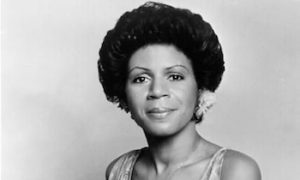
Minnie Ripperton
On this date in 1947, Minnie Riperton, a Black singer, was born.
Born in Chicago, she was the daughter of Daniel and Thelma Riperton and the youngest of eight children. She started modern dance lessons at age three, followed by ballet lessons at age 5. Her voice lessons began at age nine, and she was developing her operatic range at age 11.
At a very young age, her goal was to become a singer. Riperton studied opera under Marion Jeffries. She spent months learning how to breathe and listening to and holding vowels. Eventually, she began singing operas and operettas along with a show tune every so often. As a freshman, she sang in the Cappella choir of Hyde Park High School.
She left school early to make $10 a song, singing backup at local studios. Some reports indicate that Riperton signed her first contract at 14, while others report her at 16. Despite her natural talent (a pure five to six-octave soprano) for opera, Riperton was more attracted to "Rock N Roll" and the promise of touring. She would inevitably discontinue her classical training to follow her dream of being a contemporary vocalist. It would, however, be her classical training that brought her the success she sought. Riperton signed a recording contract with the "Gems" at Chess Studios, and in 1967 she joined the "rock/jazz/vocal ensemble" Rotary Connection.
The style of the Rotary Connection was very progressive, somewhere between rock, jazz, pop, and experimental. Riperton was with the Rotary Connection when she met the love of her life, her husband, Richard Rudolph. They had two children, Maya and Marc, whose names are included in the names of two of her songs. Maya is the girl's name in the tale of "Love And Its Glory," a personal reference to both can be found towards the end of "Lovin' You.” She sings to Marc in "Wouldn't Matter Where You Are." Riperton sang backup vocal work with Quincy Jones, Roberta Flack, Freddie Hubbard, and Etta James.
In 1969, she recorded the solo album "Come To My Garden," which was released in 1971, then "Perfect Angel" and "Adventures in Paradise" in 1974 and 1975. The following year, Riperton announced that she had been diagnosed with breast cancer and had undergone a modified mastectomy. Her "experience" (as she referred to her illness) would give her yet another reason for her life ... lending her celebrity and compassion for others to become a spokesperson for breast cancer awareness, the need for self-examination, and the benefit of early detection.
Within weeks of her surgery, she appeared for the taping of the Ebony Music Awards. When she received her "Ebby," she later revealed, she was overcome by the realization of how lucky she was to have made it through her and her family's ordeal.
Riperton continued on a crusade to reach as many women as possible. Since tennis was her game, you would find her at almost all the celebrity tournaments for charity. In 1977, President Jimmy Carter presented her with the American Cancer Society's "Courage Award." A year later, Riperton would become that organization's National Education chairwoman.
In addition to being an activist, fundraiser, lecturer, wife, and mother, she signed a contract with Capitol Records that gave her the creative freedom and production quality she desired. During the summer of 1978, she created her last album, "Minnie." Minnie Riperton, with one of the widest vocal ranges of any singer in the twentieth century, passed away in her husband’s arms on July 12, 1979, at 31 years of age.
ASCAP Biographical Dictionary
R. R. Bowker Co., Copyright 1980
ISBN 0-8351-1283-1
Heart & Soul
A Celebration of Black Music Style in America, 1930-1975
by Merlis Davin Seay, Forward by Etta James
Copyright 2002, Billboard Books
ISBN 0-8230-8314-4